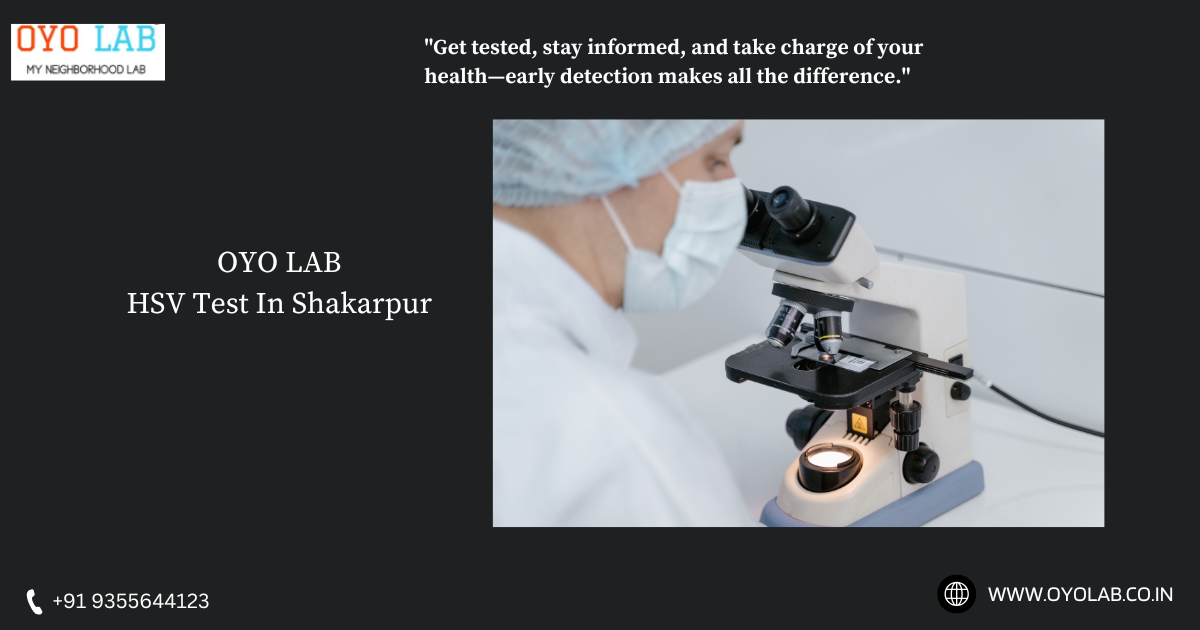
HSV Test In Shakarpur
By Shilpa | March 25, 2025
What Is HSV Test ?
The HSV Test is a diagnostic test used to detect the herpes simplex virus (HSV), which causes oral and genital herpes. There are two main types of HSV:
-
HSV-1: Usually causes oral herpes (cold sores).
-
HSV-2: Typically causes genital herpes.
Types of HSV Tests
-
PCR Test (Polymerase Chain Reaction)
-
Detects HSV DNA in a sample (blood, sore swab, or spinal fluid).
-
Highly accurate and commonly used.
-
-
Viral Culture Test
-
A sample from a sore is cultured to check for the presence of HSV.
-
Most effective if the sore is new.
-
-
Blood Test (Antibody Test)
-
Detects antibodies against HSV-1 or HSV-2 in the blood.
-
Can determine past exposure but doesn’t confirm an active infection.
-
-
Tzanck Smear Test (Less Common)
-
Examines cells from a sore under a microscope.
-
Less accurate than other tests.
-
Why Is an HSV Test Done?
-
To diagnose herpes when symptoms (blisters, sores) are present.
-
To check for HSV in pregnant women to prevent newborn infections.
-
To confirm exposure if someone has been in contact with an infected person.
Importance Of HSV Test
The HSV Test is important for several reasons, including diagnosis, treatment, and prevention of herpes simplex virus (HSV) infections. Here’s why it matters:
1. Accurate Diagnosis
-
Helps confirm whether symptoms like blisters or sores are caused by HSV-1 or HSV-2.
-
Differentiates HSV from other skin conditions (e.g., bacterial infections, allergic reactions).
2. Early Treatment & Management
-
Identifies HSV early, allowing for timely antiviral treatment (e.g., acyclovir, valacyclovir) to reduce outbreaks.
-
Helps manage symptoms and minimize discomfort.
3. Preventing Transmission
-
Knowing HSV status helps reduce the risk of spreading the virus to partners.
-
People who test positive can take precautions, such as using condoms and avoiding contact during outbreaks.
4. Protecting Pregnant Women & Newborns
-
HSV can be dangerous for newborns, leading to neonatal herpes, which can cause severe complications.
-
Pregnant women with HSV can be monitored, and C-sections may be recommended to prevent transmission during birth.
5. Identifying Asymptomatic Infections
-
Many people with HSV have no symptoms but can still spread the virus.
-
A blood test can detect past exposure even if a person has never had symptoms.
Benefits Of HSV Test
1. Reduces Misdiagnosis & Anxiety
-
Confirms whether symptoms are caused by HSV or another condition.
-
Provides peace of mind and reduces unnecessary worry.
2. Supports Long-Term Health Management
-
Helps individuals manage outbreaks with medication and lifestyle changes.
-
Encourages regular health check-ups for overall well-being.
3. Identifies Asymptomatic Infections
-
Many people with HSV don’t show symptoms but can still spread the virus.
-
A blood test can detect past exposure even in symptom-free individuals.